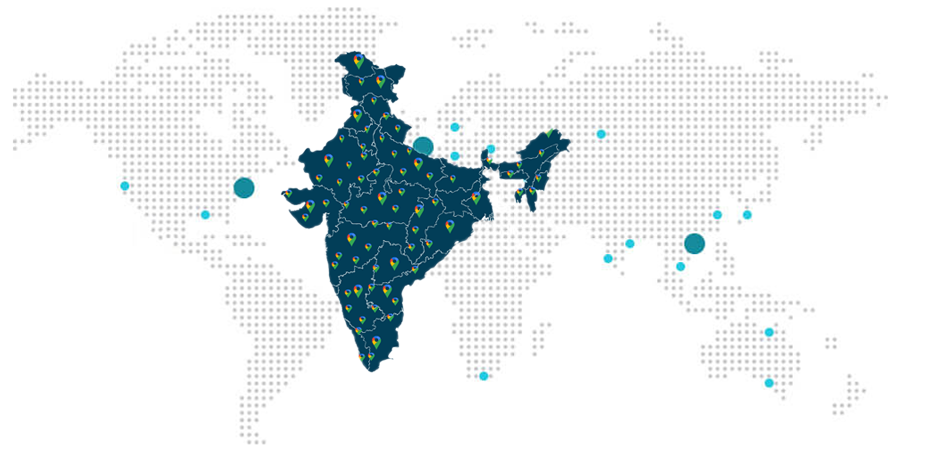About GST and GST Portal
Categories
GST Services
What is GST (Goods & Services Tax)?
GST stands for goods & services tax. It is a tax levied on sales & purchases of goods & services. It is a tax levied on almost all the businesses in India. It is a single tax comprising of sales tax, service tax and excise duty.
As you know, there are multiple times an item is changed from one point to another - Manufacturer to whole seller/retailer to consumer. GST is levied at all stages of supply chain which makes it a multi-stage tax.
For example – Suppose a manufacturer makes biscuits by using ingredients like flour, sugar and other material. When manufacturer mixes sugar & flour to make biscuits, the value of the input increases. After making the biscuit, manufacturer sells the same to the warehousing agent who takes the responsibility of packing the large quantities of biscuits and labels it. Then, these biscuits are sold to the retailer by the warehouse agent which is considered as another addition to the value of inputs. After receiving the biscuits, retailer packs these biscuits in small quantities and invests in the marketing of biscuits that leads to increase in its value. GST is levied on all these stages of value addition and final amount is paid by the consumer.
In case you are manufacturing goods in Maharashtra and selling it to final consumer in Karnataka. GST will be levied in Karnataka as it is the point of consumption. Hence, the tax revenue will go to Karnataka and not Maharashtra.

Journey of GST in India till 2019
Planning of launching GST law started in the year 2000 when a committee has been formed to set up GST law and it comes into force on 1st July 2017 when amended GST bill was passed in Rajyasabha and Loksabha. It took 17 years for GST law to come into force and how the development of GST has taken place is shown in the table below –
| Year | Decisions Taken |
| 2000 | PM Atal Bihari Vajpayee formed a committee to draft GST law. |
| 2004 | Task force decided to implement GST to improve the current tax structure of the country |
| 2006 | Finance minister proposes to introduce GST from April1, 2010 |
| 2007 | Steps are taken to phase out CST. Rates are reduced from 4% to 3% |
| 2008 | Election commission finalizes dual GST structure to have separate levy, legislation |
| 2010 | Project launching of computerized commercial taxes but implementation of GST postponed |
| 2011 | Amendment bill in the constitution introduced to enable GST law |
| 2012 | Discussion on GST begins in the standing committee but stalled it over clause 279B |
| 2013 | Standing committee produced its report on GST |
| 2014 | Reintroduction of GST bill by the finance minister in the parliament |
| 2015 | GST bill passed in Loksabha but not passed in Rajyasabha |
| 2016 | |
| 2017 | |
| 2018 | Revision in GST tax rates on January 18, 2018 |
| 2019 |
Components of GST
There are 3 components under GST system –
CGST (Central Goods and Service Tax)
Tax collected by the central government on an intra-state sale (Transactions taking place within the state)
SGST (State Goods and Service Tax)
Tax collected by the state government on an intra-state sale (Transactions taking place within the state)
IGST (Integrated Goods and Services Tax)
Tax collected by the central government on an inter-state sale (Transactions taking place in another state)
Comparison between Old Tax Structure & New Tax Structure
| Transactions | Old tax structure | New tax structure | Revenue |
| Sales within state | VAT + central excise/service tax | CGST + SGST | Centre & state equally share the revenue |
| Sale to another state | Central sales tax + excise/service tax | IGST | In case of inter-state sales, only one type of tax exists i.e. IGST revenue which is shared by the center based on the destination of goods. |
For example – A goods dealer in Delhi sells goods to a dealer in Punjab (Transaction taking place in another state) amounting to Rs. 50000. The tax rate levied is 18% i.e. IGST. In this case, the goods dealer will be charged Rs. 9000 as IGST and the revenue will go to the central government.
If the same dealer sell goods to a dealer in Delhi (Transaction taking place in the same state) amounting to Rs. 50000. The tax rate levied is 12% i.e. CGST at 6% & SGST at 6%. In this case, the goods dealer will be charged Rs. 6000 as GST out of which Rs. 3000 will go to the central government as CGST & Rs. 3000 will go to the state government as SGST.
Tax laws before GST
If we will talk about the tax laws before introduction of GST, there are many indirect taxes which are levied by both center & the state. Every state has different rules & regulations. VAT is collected by the state whereas CST is collected by the central government which is applicable in case of inter-state sales.
Other than these taxes, many other indirect taxes are also levied by state & center government such as octroi, entertainment tax, local tax etc. Excise duty has also been charged by the center at the time when the goods are manufactured & sold. VAT was also charged by the state over & above the excise duty which results in overlapping of taxes levied by both state & center. List of indirect taxes applicable before GST are as follows –
- State VAT
- CST
- Luxury tax
- Entertainment tax
- Central sales tax
- Purchase tax
- Advertisement tax
- Taxes on lotteries, betting & gambling
- Excise duties
- Central excise duty
- Additional duties of customs
- Additional duties of excise
- Special additional duties of customs
All the above taxes are replaced by CGST, SGST & IGST. However, CST is chargeable at 2% concessional rate on inter-state purchase as issue & utilization of form C is still generally used for certain non-GST goods such as high speed diesel, Natural gas, Petroleum crude, Aviation turbine fuel, Motor spirit (known as petrol), alcoholic liquor for human consumption in respect of the following transactions only –
- Use in manufacturing & processing
- Resale
- Use in the mining or generating or distribution of electricity or telecommunication network or any other power.
About GST Portal
GST portal is the portal started by government in order to provide various types of services such as GST registration, refund application, traversing through GST return filing and applying for cancellation of GST registration.
It is started by government so that taxpayers can easily file & submit their GST returns online and no longer visit in person to the tax department for assessments, submitting application for return. There are many facilities provided by GST portal which are as follows –
- Responding to applications
- Rejection or approval of applications
- Intimation notice by the department and response by the taxpayer.
What Clients Say

Prakash Verma


Praveen Chauhan


Pradeep Kochhar

Blogs
In today's dynamic business landscape, navigating through various regulatory requirements and financial obligations can be... Read More
FinacBooks is a reliable platform that helps business owners in getting verified leads. It offers various services and solutions that can... Read More
Starting a new business in India requires several legal procedures, paperwork, and timely compliance with regulatory authorities. Company... Read More








